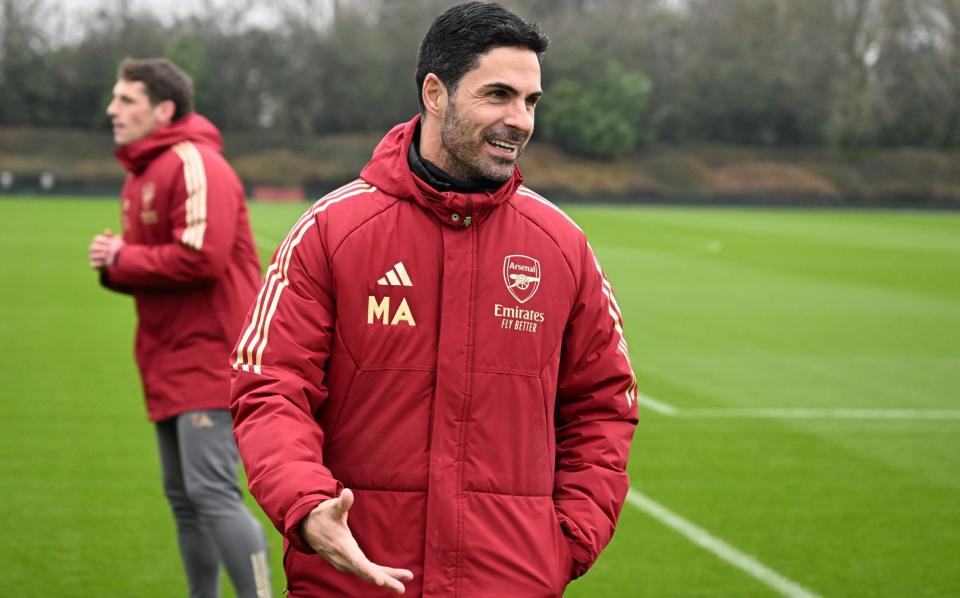Mikel Arteta’s Arsenal record in Europe is the one question mark hanging over him

Almost everything at Arsenal has changed since Mikel Arteta’s appointment in December 2019, from the players to the executives to the entire sense of purpose at the club, but one thing has largely remained the same: their poor record in big European ties.
As Arsenal manager, Arteta has been on the touchline for five European knockout matches at the Emirates Stadium. Arsenal have won none of those games. Olympiakos (twice), Slavia Prague, Villarreal and Sporting Lisbon have all travelled to north London in the Europa League knockout stages, and all have either avoided defeat or claimed victory.
Given Arsenal’s enormous progress in the Premier League, their European record under Arteta feels like an unusual quirk. The Spaniard has shown himself capable of transforming a club, of rebuilding a team and of winning trophies, but he has not yet proven that he can navigate the unique trickiness of two-legged European contests.
What has been the problem? Well, it could be an issue of experience. Arteta may be a Spanish manager but precious little of his career has actually been spent in Europe. He joined Rangers in 2002, at the age of 20, and aside from a brief spell with Real Sociedad in 2004, has been enmeshed in British football ever since.
As a player, only a fifth of Arteta’s senior appearances came for non-British clubs (Barcelona B, Paris Saint-Germain and Sociedad). As a coach, his entire career has been spent on these shores. He may be from the continent, but that does not mean he is necessarily familiar with its football.
A point of clarification: Arteta has won a “home” knockout match in the Europa League, against Benfica, but that match actually took place in Greece because of Covid-19 restrictions. He has never done so at the Emirates, with last year’s loss to Sporting proving particularly painful for a club that, on paper at least, should have gone all the way in the Europa League.

The European record is one of the few question marks still hovering over Arteta’s head, and there could be no better time to provide an emphatic answer than against Porto on Tuesday. Arsenal have not reached the quarter-finals of the Champions League since 2010, and their supporters are expecting victory this week.
Asked about his team’s difficulties in Europe since he took over, Arteta bristled. “If you see the stats it is the reality, isn’t it? Let’s try to change it,” he said. “The sample is a little bit small, huh? Let’s try to change it.”
In fairness to Arteta, Arsenal’s poor European record predates his arrival as manager. They go into Tuesday night on a run of five consecutive home defeats in Champions League knockout ties, the most recent of which was a 5-1 thrashing by Bayern Munich in 2017.
In the past decade or so, the most impressive of Arsenal’s European campaigns came under Unai Emery. He guided the club past Rennes, Napoli and Valencia to reach the Europa League final of 2019, before losing to Chelsea. Wenger stumbled at the semi-final stage of the same competition in 2018, as did Arteta in 2021.
It is unquestionable that Arsenal have underperformed in European competition, when the pace of the game is different and the opposition pose more unfamiliar tests. The refereeing, too, is often more strict. This was certainly a source of frustration for Arsenal in the first leg in Porto, when the whistle seemed to blow every 30 seconds.

It might have helped, then, that Arsenal endured a similarly stop-start game against Brentford on Saturday. Arteta’s players had to be patient in the face of Brentford’s gamesmanship, and eventually found a winner in the 86th minute. Across the full match, the ball was in play for just 49 minutes.
“There are so many different things going on in each game,” said Martin Odegaard, the Arsenal captain. “This game [the first leg against Porto] was one where the ball was out of play a lot — a lot of stop and start and restarts and all this.
“I think you saw that also against Brentford, and I think we dealt with it in a brilliant way. I think that was good practice. We already showed in that game what we learned in Porto, hopefully we can do that even better tomorrow. First of all, we want to play our game. We don’t want to focus too much on them and what they are doing. We want to play our game and that’s the main thing.”
Arsenal know, if they play at their best against Porto, they will go through. But too often in recent years they have failed to reach those levels in European competition, and too often they have paid the price for those shortcomings. The time has surely come for that to change.

 Yahoo Sport
Yahoo Sport 





































